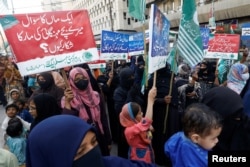
Islamabad - Pakistan's currency fell 7% against the U.S. dollar Thursday as the government struggles to persuade the International Monetary Fund to resume lending to the cash-strapped country to help avert a default on its foreign debt.
The Pakistani rupee has weakened to a record low in recent weeks after foreign exchange companies were allowed in January to remove a cap on the exchange rate. The currency's official value closed at 285.09 rupees against the dollar Thursday versus 266.11 the previous day.
The market-determined currency exchange rate is a key IMF demand for Prime Minister Shehbaz Sharif's government to complete before the lender's board approves a funding tranche of more than $1 billion to Pakistan.
Islamabad has since failed to secure the tranche, which was initially expected to be disbursed in December as part of a stalled $6.5 billion IMF bailout program, over a lack of progress on fiscal consolidation.
"A delay in IMF funding is creating uncertainty in the currency market," said Mohammed Sohail of Topline Securities, a Karachi-based brokerage house.
The IMF program is key to unlocking other external bilateral and multilateral financing sources for Pakistan. The drawn-out negotiations between the two sides are putting pressure on government finances and the country's more than 220 million population.
Pakistan's foreign exchange reserves have dwindled to precarious levels and stood at just over $3 billion, hardly enough for three weeks of imports.
Inflation has also skyrocketed to 31.5%, according to official data published Wednesday. Food and fuel prices have soared beyond the means of many Pakistanis.
Decades of financial mismanagement, corruption, and political instability are blamed for pushing Pakistan's economy to the brink of default. A global energy crisis and last year's devastating floods across the country have worsened the crisis.
The Sharif administration has already taken most other actions to keep the talks with the IMF on track. They include a hike in fuel and energy tariffs, the withdrawal of subsidies in export and power sectors and generating more revenue through new taxation in a supplementary budget.
Analysts anticipated the fiscal adjustments would likely further fuel inflation in Pakistan whether or not a deal with the IMF has been reached.
 Women along with their children carry placards as they take part in a protest against price increases, in Karachi, Pakistan, Feb. 15, 2023.
Women along with their children carry placards as they take part in a protest against price increases, in Karachi, Pakistan, Feb. 15, 2023.
Pakistani Finance Minister Ishaq Dar rejected reports as "malicious rumors" that the country was on the verge of a default.
"This is not only completely false but also belie the facts. SBP forex reserves have been increasing and are almost U.S. $1 billion higher than four weeks ago, despite making all external due payments on time," Dar tweeted Thursday.
"Our negotiations with IMF are about to conclude and we expect to sign staff level agreement with IMF by next week. All economic indicators are slowly moving in the right direction," Dar asserted. He added that foreign commercial banks had started extending facilities to Pakistan.
China, a longtime ally of Pakistan, is the only country that has helped Islamabad get a $700 million loan facility from the China Development Bank last month.
IMF Managing Director Kristalina Georgieva, while speaking at last month's Munich Security Conference, urged Pakistan to collect more taxes from the wealthy and spend the money on the poor.
"Why should rich people benefit from subsidies when the country faces such a difficult task? Why should rich people and businesses not pay their taxes when the country has such tremendous challenges?" she asked while responding to a question about the delay in reaching a deal with Pakistan.
"In my view what is at stake is fairness in society and we will stand for this fairness, of course, very much hoping that we can get to a good point in moving the policy in Pakistan in the right direction," Georgieva said.
Pakistan has long been under fire for not imposing taxes on the wealthy in a country where less than 2% pay income taxes. The rest evade it either in collusion with tax authorities or by exploiting loopholes in the legal system, say financial experts.
The World Food Program, in its latest assessment, has warned the ongoing economic crisis in Pakistan is 'progressively deteriorating, with a depreciated currency, increased food and fuel prices and uncertainty over resuming a $6.5 billion funding package with the IMF."
The statement added that flood-affected people "are resorting to negative coping strategies that include the sale of income-producing assets, taking on additional debt, withdrawing children from school, and skipping meals."
Some information for this report came from Reuters.

Post a Comment